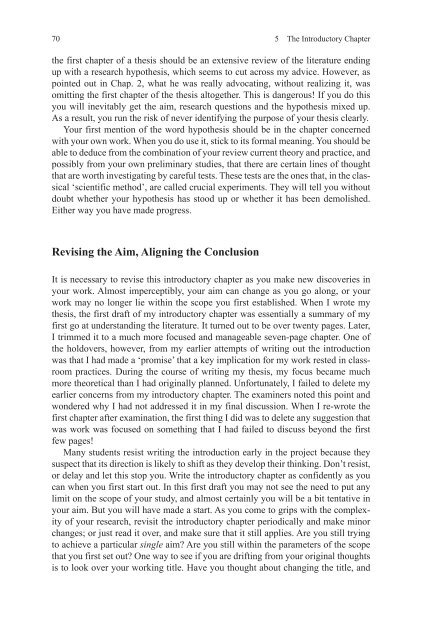How-to-Write-a-Better-Thesis
You also want an ePaper? Increase the reach of your titles
YUMPU automatically turns print PDFs into web optimized ePapers that Google loves.
70<br />
5 The Introduc<strong>to</strong>ry Chapter<br />
the first chapter of a thesis should be an extensive review of the literature ending<br />
up with a research hypothesis, which seems <strong>to</strong> cut across my advice. <strong>How</strong>ever, as<br />
pointed out in Chap. 2, what he was really advocating, without realizing it, was<br />
omitting the first chapter of the thesis al<strong>to</strong>gether. This is dangerous! If you do this<br />
you will inevitably get the aim, research questions and the hypothesis mixed up.<br />
As a result, you run the risk of never identifying the purpose of your thesis clearly.<br />
Your first mention of the word hypothesis should be in the chapter concerned<br />
with your own work. When you do use it, stick <strong>to</strong> its formal meaning. You should be<br />
able <strong>to</strong> deduce from the combination of your review current theory and practice, and<br />
possibly from your own preliminary studies, that there are certain lines of thought<br />
that are worth investigating by careful tests. These tests are the ones that, in the classical<br />
‘scientific method’, are called crucial experiments. They will tell you without<br />
doubt whether your hypothesis has s<strong>to</strong>od up or whether it has been demolished.<br />
Either way you have made progress.<br />
Revising the Aim, Aligning the Conclusion<br />
It is necessary <strong>to</strong> revise this introduc<strong>to</strong>ry chapter as you make new discoveries in<br />
your work. Almost imperceptibly, your aim can change as you go along, or your<br />
work may no longer lie within the scope you first established. When I wrote my<br />
thesis, the first draft of my introduc<strong>to</strong>ry chapter was essentially a summary of my<br />
first go at understanding the literature. It turned out <strong>to</strong> be over twenty pages. Later,<br />
I trimmed it <strong>to</strong> a much more focused and manageable seven-page chapter. One of<br />
the holdovers, however, from my earlier attempts of writing out the introduction<br />
was that I had made a ‘promise’ that a key implication for my work rested in classroom<br />
practices. During the course of writing my thesis, my focus became much<br />
more theoretical than I had originally planned. Unfortunately, I failed <strong>to</strong> delete my<br />
earlier concerns from my introduc<strong>to</strong>ry chapter. The examiners noted this point and<br />
wondered why I had not addressed it in my final discussion. When I re-wrote the<br />
first chapter after examination, the first thing I did was <strong>to</strong> delete any suggestion that<br />
was work was focused on something that I had failed <strong>to</strong> discuss beyond the first<br />
few pages!<br />
Many students resist writing the introduction early in the project because they<br />
suspect that its direction is likely <strong>to</strong> shift as they develop their thinking. Don’t resist,<br />
or delay and let this s<strong>to</strong>p you. <strong>Write</strong> the introduc<strong>to</strong>ry chapter as confidently as you<br />
can when you first start out. In this first draft you may not see the need <strong>to</strong> put any<br />
limit on the scope of your study, and almost certainly you will be a bit tentative in<br />
your aim. But you will have made a start. As you come <strong>to</strong> grips with the complexity<br />
of your research, revisit the introduc<strong>to</strong>ry chapter periodically and make minor<br />
changes; or just read it over, and make sure that it still applies. Are you still trying<br />
<strong>to</strong> achieve a particular single aim? Are you still within the parameters of the scope<br />
that you first set out? One way <strong>to</strong> see if you are drifting from your original thoughts<br />
is <strong>to</strong> look over your working title. Have you thought about changing the title, and














![[Lonely Planet] Sri Lanka](https://img.yumpu.com/59845622/1/169x260/lonely-planet-sri-lanka.jpg?quality=85)


